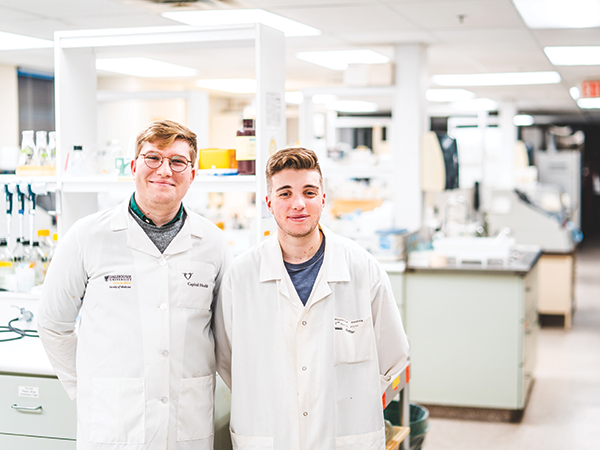
B
eing a trans engineering student at Dalhousie’s Sexton campus hasn’t been an easy experience for Maxxim Vigneau.
“It was scary to come out in engineering. To have that environment of predominantly straight, cis, white males was very intimidating,” says the 20-year-old. “I was scared that I was going to be ridiculed or judged.”
While Vigneau had a professor he turned to for help, he still feels isolated and alone at Sexton. He’s never met or heard of any other trans students there.
“I have profs that still think I’m female; that will still call me ‘she’ or by my old name,” says Vigneau. Professors that “don’t even seem to know or understand that it’s possible to have a trans student,” he adds.
Intimidation and isolation are common for 2SLGBTQ+ people in science, technology, engineering and mathematics (STEM) fields. But there’s a new initiative underway in Halifax to help with these experiences of isolation.
Queer Atlantic Canadian STEM and this weekend’s first-of-its-kind queer STEM conference, the QAtCanSTEM Colloquium, are working to connect and highlight queer voices in the math and science field.
The initiative was started by Landon Getz, a queer PhD student with Dalhousie’s microbiology and immunology department.
“Queer people tend to feel quite isolated in their departments; They might be the only out person,” says Getz. He says it’s important to “have a community to talk to about issues you’re having or just more generally about your science and feeling comfortable.”
Getz says some people might also hide their identities because they don’t feel represented or safe. (A study of professionals working in STEM published in 2015 in the Journal of Homosexuality found that 43 of respondents are not out to their colleagues.)
“That’s really where I think my role comes in as an out queer person...I can use my own identity and my own position to help people feel comfortable,” Getz adds.
At the inaugural QAtCanSTEM Colloquium—January 17 and 18 at Dalhousie—students and faculty from a number of departments will showcase their research. There are also two keynote speakers and a panel discussion that will focus on queer experiences in STEM, both positive and negative, and what can be done to improve things.
The Colloquium received financial support from Dalhousie University and Saint Mary’s University as event sponsors—a gesture Getz was happy to see.
“I think it’s really important for Dalhousie to be a leader in these areas because it’s the biggest institution in the Atlantic provinces,” he says. “We have a responsibility to really push these diversity and inclusion measures because we have the resources to do it.”
A university spokesperson didn’t provide any examples of specific programs for 2SLGBTQ+ students in STEM, but a statement says there are “a number of supports in place including academic and health services, to ensure students in every program are supported during their studies.”
Those include the Human Rights and Equity Services office (HRES), DalOut, OUTlaw, Get Real and the South House Sexual & Gender Resource Centre.
There is also a queer faculty and staff caucus that Jacqueline Gahagan is a member of. Gahagan feels there is more that can be done to improve the academic experience for 2SLGBTQ+ students and faculty.
“This is a conversation that we need to have in terms of how do we improve the experience of students so they’re not sitting in classrooms hearing things that are triggering,” they say.
Although there are many supports in place and Dalhousie’s strategic direction includes a Gender Affirmation Policy, Gahagan is contacted from time to time by trans and queer students who are looking for help addressing something a professor said in class.
“That signals to me that there’s more work to be done,” says Gahagan.
Vigneau has been in classes where profs only use the male pronoun to explain problems and theories, even if the author is unknown.
“What I’d rather just hear once in a while is them or they, or this person,” he says.
One main effort from Dalhousie’s queer faculty and staff caucus is a proposal for a 2SLGBTQ+ learning and teaching space. It could offer resources and be used to host discussion groups, movie nights and speaker series in a “safe and affirming” environment.
Vigneau, now in his third year, will need to miss a few weeks of class for surgery. He’s worried about how the stigma of being trans might affect finding a co-op placement. And at this point, with his experiences to date, there isn’t anyone he feels comfortable talking to in the engineering department.
Gahagan hopes the new space would send a strong message to the greater student body, and students like Vigneau—who has less access to resouces studying at Sexton campus.
“To make institutional change happen in a big and bold way I think there has to be leadership coming from admin, saying we’re going to launch a capital campaign to build a building that’s dedicated to LGBTQ2S+issues,” they say. “It would give a sense of visibility and permanency about the notion that LGBTQ2S+ issues matter on campus.”
